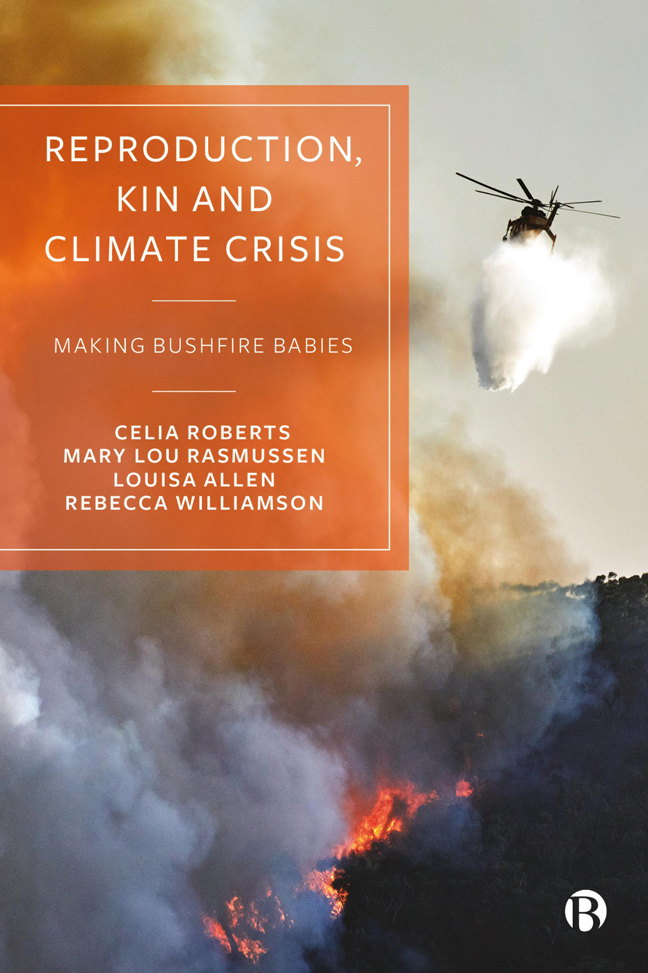Book contents
- Frontmatter
- Contents
- List of Figures and Table
- Notes on the Figures
- Notes on the Authors
- Acknowledgements
- Interleave 1
- 1 Reproducing in Climate Crisis
- Interleave 2
- 2 Methods in Crisis
- Interleave 3
- 3 Breath, Breathing and ‘Mum-Guilt’
- Interleave 4
- 4 Smoke, Machines and Public Health
- Interleave 5
- 5 Kin, Care and Crises
- Interleave 6
- 6 Pyro-reproductive Futures
- Interleave 7
- 7 Making Bushfire Babies
- Notes
- References
- Index
7 - Making Bushfire Babies
Published online by Cambridge University Press: 24 January 2024
- Frontmatter
- Contents
- List of Figures and Table
- Notes on the Figures
- Notes on the Authors
- Acknowledgements
- Interleave 1
- 1 Reproducing in Climate Crisis
- Interleave 2
- 2 Methods in Crisis
- Interleave 3
- 3 Breath, Breathing and ‘Mum-Guilt’
- Interleave 4
- 4 Smoke, Machines and Public Health
- Interleave 5
- 5 Kin, Care and Crises
- Interleave 6
- 6 Pyro-reproductive Futures
- Interleave 7
- 7 Making Bushfire Babies
- Notes
- References
- Index
Summary
Donna Haraway's exhortation to ‘Make kin, not babies’ has accompanied us throughout this text. The slogan is used in Haraway's speculative fiction experiment, ‘The Camille Stories’, and elsewhere in her book Staying with the Trouble (2016). It derives from Haraway's belief that there are too many humans in the world and that privileged people should focus on building kin relations beyond those predicated on producing more human individuals (Haraway is clear that some marginalized and oppressed people do not have enough children and should be helped to have more) (Haraway, 2018: 69–74).
In conversation with Haraway, and working within the frame of ecofeminism and environmental humanities, Australian feminist Jennifer Mae Hamilton draws our attention to the hard work of mothering. Like us, Hamilton is interested in caring, particularly ‘the sweaty work implied by the notion of making kin’ during extreme bushfires. Hamilton pushes back against Haraway's injunction to ‘Make kin, not babies’, arguing Haraway romanticizes the work of kin making and asking:
What does it take to make kin and not babies? Perhaps it takes the strength of a mother breast-feeding in an apocalyptic heatwave, in a house poorly designed for the climate, oriented badly on the subdivided and fragmented stolen land? Perhaps the caregiver is dripping in sweat trying to keep this other being alive. Breathing is hard. Caring is hard. In other words, the kinds of embodied, sweaty work implied by the notion of making kin … is probably going to be eerily like the more undesirable and mundane kinds of housework involved in making babies.
(Hamilton, 2019: 486)We agree that Haraway's emphasis on kin making in ‘The Camille Stories’ could be characterized as optimistic, even romantic. The dream that each human or symbiont child should have three (or more parents), for example (Haraway, 2016: 138; Haraway 2018: 96), both underestimates the number of parents many children have already (thus affirming heteronormative, settler models of one-or two-parent families) (see also Benjamin, 2018; Tallbear, 2018) and assumes that more parents means better parenting and a more positive experience of growing up. Of course, having three not-so-great parents could be worse than having only one or two of them! ‘The Camille Stories’ also skip over what might be involved in ‘discouraging’ people from having babies even while ‘actively cherishing’ reproductive freedoms and rejecting coercion (Haraway, 2016: 139).
- Type
- Chapter
- Information
- Reproduction, Kin and Climate CrisisMaking Bushfire Babies, pp. 181 - 187Publisher: Bristol University PressPrint publication year: 2023

